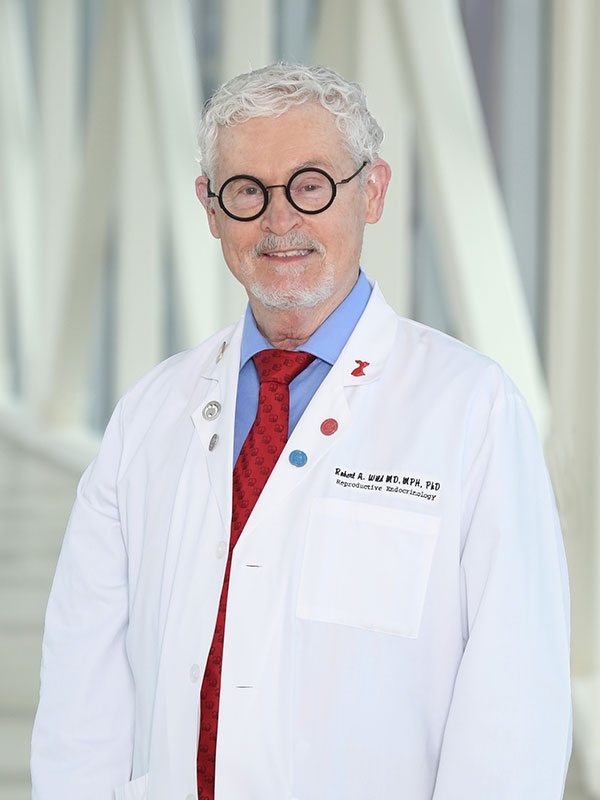OKLAHOMA CITY, OKLA. – Both obesity and metabolic syndrome – a cluster of conditions like high blood pressure and high blood sugar – increase the risk of breast cancer, but in differing ways for different subtypes of the cancer. A University of Oklahoma researcher helped to lead a national study that produced those results, which may help physicians better care for patients at higher risk for breast cancer.
The study is from the Women’s Health Initiative (WHI), an effort that began in the early 1990s and continues to yield valuable data about postmenopausal women’s risks for cancer, cardiovascular disease, osteoporosis and other conditions. The initiative, funded by the National Heart, Blood and Lung Institute, a component of the National Institutes of Health, is the largest women’s health prevention study ever conducted.
Robert Wild, M.D., Ph.D., a professor of obstetrics and gynecology in the OU College of Medicine, has been involved with the WHI since its beginning and is a co-author of the latest study, published in Cancer, a journal of the American Cancer Society. The research followed another WHI study showing that women who ate a low-fat diet for about eight years decreased their risk of dying from breast cancer by 21% over the next 20 years. Those findings led researchers to consider whether the reduced risk was related to a decrease in obesity or an improvement in the conditions associated with metabolic syndrome. As it turns out, the answer is both.

“This study shows that obesity had an effect on breast cancer independent of metabolic syndrome, and that metabolic syndrome had an effect on breast cancer independent of obesity,” Wild said. “And they affected various subtypes in different ways, which influenced whether women were diagnosed with breast cancer and whether they died from it.”
The upshot of the study is simpler: Keeping both waist circumference and metabolic conditions under control is important to reduce the risk of being diagnosed with breast cancer and the risk of dying from it.
“This study is essentially saying to get back to the basics,” he said. “Prevention is important, and we need to be paying attention to both metabolic syndrome and weight.” Metabolic syndrome includes increased blood pressure, high blood sugar, excess body fat around the waist, and abnormal cholesterol or triglycerides (a type of fat in the blood), all of which also increase the risk for cardiovascular disease and diabetes.
More specifically, the study found that:
Including this latest study, Wild has been a co-author on dozens of previous publications using data from the more than 161,000 women enrolled in various WHI studies.
“The Women’s Health Initiative is the gift that keeps on giving,” Wild said. “It is a great opportunity to make use of quality information. In the beginning, I don’t think we knew what a valuable resource it would still be years later.”
About the Project
Read the full publication, titled “Breast cancer incidence and mortality by metabolic syndrome and obesity: The Women’s Health Initiative,” at https://doi.org/10.1002/cncr.35318.
About the University of Oklahoma
Founded in 1890, the University of Oklahoma is a public research university located in Norman, Oklahoma. As the state’s flagship university, OU serves the educational, cultural, economic and health care needs of the state, region and nation. OU was named the state’s highest-ranking university in U.S. News & World Report’s most recent Best Colleges list. For more information about the university, visit www.ou.edu.
To combat power outages and extreme weather events, a team led by University of Oklahoma researchers has helped launch a project utilizing electric school buses as a backup energy resource.
The University of Oklahoma Health Campus was recently recognized for its increased momentum in advancing discoveries that change lives, achieving the state’s first Top 100 national ranking based on funding from the National Institutes of Health, according to the Blue Ridge Institute for Medical Research. The ranking—the highest in OU’s history and in the state—solidifies the University’s position as the state’s leading driver of health-related research.
Stefano Tarantini, an assistant professor in the Department of Neurosurgery at the University of Oklahoma College of Medicine, spends his days in the laboratory searching for answers to the cognitive decline that too often plagues older adults.